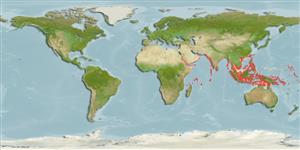Common names from other countries
Пластиножаберные (акулы и скаты) (sharks and rays) >
Carcharhiniformes (Ground sharks) >
Carcharhinidae (Requiem sharks)
Etymology: Carcharhinus: karcharos (Gr.), sharp or jagged; rhinus, an ancient name for sharks, from rhine (Gr.), rasp, both words alluding to a shark's jagged, rasp-like skin. (See ETYFish); hemiodon: hemi-, from hemisys (Gr.), half; odon (Gr.), tooth, allusion not explained, perhaps referring to how teeth on upper jaw are serrated basally and smooth distally. (See ETYFish).
Environment: milieu / climate zone / depth range / distribution range
экология
морской; солоноватоводный демерсальный; амфидромный (Ref. 51243); пределы глубины 10 - 150 m (Ref. 106604). Deep-water; 25°N - 13°S
Indo-West Pacific: Gulf of Oman to Pakistan, India, and possibly Sri Lanka. Scattered localities from the eastern Indian Ocean and the western Pacific ranging from India to New Guinea.
Size / Вес / Возраст
Maturity: Lm ? range ? - ? cm
Max length : 200 cm TL самец/пол неопределен; (Ref. 9997)
колючие лучи спинного плавника (общее число) : 0; колючие лучи анального плавника: 0. Grey above, white below, with the tips of the pectorals, and upper and lower caudal-fin lobes black; other fins dusky (Ref. 9997).
A little-known shark found on the continental and insular shelves (Ref. 244). Reports from river mouths and rivers are based on old records that need verification (Ref. 9997). Probably feeds on small fishes, cephalopods, and crustaceans (Ref. 9997). Viviparous (Ref. 50449). Utilized fresh for human consumption (Ref. 9997).
Life cycle and mating behavior
Maturities | размножение | Spawnings | Egg(s) | Fecundities | личинки
Distinct pairing with embrace (Ref. 205). Viviparous, placental (Ref. 50449).
Compagno, L.J.V., 1984. FAO Species Catalogue. Vol. 4. Sharks of the world. An annotated and illustrated catalogue of shark species known to date. Part 2 - Carcharhiniformes. FAO Fish. Synop. 125(4/2):251-655. Rome: FAO. (Ref. 244)
Статус Красного Списка МСОП (Ref. 130435)
Использование человеком
рыболовство: рыболовство как средство для существования
дополнительная информация
инструменты
Специальные отчеты
Скачать в формате XML
ресурсы в Интернет
Estimates based on models
Preferred temperature (Ref.
115969): 25.2 - 29.1, mean 28.3 (based on 844 cells).
Phylogenetic diversity index (Ref.
82804): PD
50 = 0.5000 [Uniqueness, from 0.5 = low to 2.0 = high].
Bayesian length-weight: a=0.00479 (0.00221 - 0.01036), b=3.09 (2.92 - 3.26), in cm Total Length, based on LWR estimates for this Genus-body shape (Ref.
93245).
Trophic level (Ref.
69278): 4.2 ±0.58 se; based on food items.
устойчивость к внешним воздействиям (Ref.
120179): низкий, минимальное время удвоения популяции 4.5-14 лет (Fec assumed to be <100).
Fishing Vulnerability (Ref.
59153): Very high vulnerability (90 of 100).
